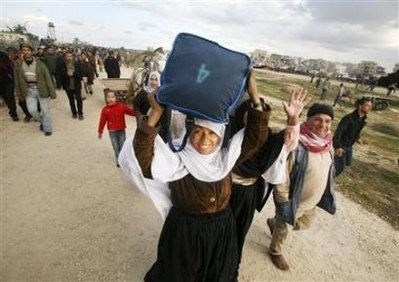Tens of thousands cross downed Gaza wall
Updated: 2008-01-23 16:53
RAFAH, Gaza Strip -- Tens of thousands of Palestinians poured from the Gaza Strip into Egypt Wednesday after masked gunmen with explosives destroyed most of the seven-mile wall dividing the town of Rafah, which straddles the border.
|
|
The Gazans crossed on foot, in cars or riding donkey carts to buy supplies made scarce by an Israeli blockade of their impoverished territory. Police from the militant group Hamas, which controls Gaza, directed the traffic. Egyptian border guards took no action.
The gunmen began breaching the wall dividing Rafah before dawn, according to witnesses and Hamas officials, who told The Associated Press that they later closed all but two of the gaps in the wall. The officials, who spoke on condition of anonymity due to the sensitivity of the matter, said they were allowing Palestinians to move freely through the two gaps.
Thousands of Gazans began crossing into Egypt and returning with milk, cigarettes and plastic bottles of fuel, the Hamas officials and witnesses said.
An Associated Press reporter arrived after first light and saw that about two-thirds of the Rafah wall had been demolished. The reporter also saw the crowd of Palestinians crossing into Egypt swell into the tens of thousands.
Guards directed the crowds over the fallen metal through two main crossing areas, inspecting some bags. One man returning to Gaza carried seven pistols that were confiscated by Hamas police. Others walked unhindered over the piles of scrap metal that once made up the border wall.
The identity of the gunmen who breached the border was not immediately clear. But in a statement, Hamas expressed support for the move, saying, "Blowing up the border wall with Egypt is a reflection of the ... catastrophic situation which the Palestinian people in Gaza are living through due to the blockade."
Egypt has largely kept its border with Gaza closed since the violent Hamas takeover of the territory in June, amid concerns of a spillover of Hamas-style militancy into Egypt.
However, Gaza's Hamas rulers have orchestrated daily demonstrations on the Gaza-Egypt border, in an apparent attempt to appeal to Arab public opinion and pressure Egypt to open the passage.
The destruction of the wall came on the sixth day of a complete closure of Gaza, imposed by Israel and backed by Egypt, in response to a spike in Gaza rocket attacks on Israeli border towns.
On Tuesday, Israel eased the closure slightly, transferring fuel to restart Gaza's only power plant, and also sent in some cooking gas, food and medicine. Israel has pledged to continue limited shipments because of concerns that a humanitarian crisis could develop in the already impoverished coastal territory.
However, Gazans are still facing critical shortages of electricity, fuel and other supplies. The territory has been largely cut off from the world since June, when Hamas seized power in Gaza by force.
With the latest blockade, Israel is trying to halt rocket fire that has sent residents in Israeli border communities scrambling for shelter several times a day. The rockets have traumatized many area residents and killed 12 Israelis in six years. Rocket fire has persisted despite the closure.
Israeli officials would not immediately comment on Wednesday's incident.
Before dawn Wednesday, Palestinian gunmen began blowing holes in the border wall running through Rafah, along the Gaza-Egypt border. There were 17 explosions in all, Hamas security officials said.
All Egyptian security and police officers were pulled out from the immediate vicinity of the border, Egyptian security officials said on condition of anonymity because of the sensitivity of the issue. They did not explain why the officers had been withdrawn.
Gazan Ibrahim Abu Taha, 45, a father of seven, was in the Egyptian section of Rafah with his two brothers and $185 in his pocket. "We want to buy food, we want to buy rice and sugar, milk and wheat and some cheese," Abu Taha said in a telephone interview, adding that he would also buy cheap Egyptian cigarettes.
Abu Taha said he could get such basic foods in Gaza, but at three times the cost.
An off-duty Hamas security officer who identified himself as Abdel Rahman, 29, said this was his first time out of Gaza. "I can smell the freedom," he said. "We need no border after today."
Abdel Rahman said no weapons were being smuggled in from Egypt. "You can buy weapons in Gaza, guns and RPGs," he said.
Weapons are generally brought into Gaza through smuggling tunnels under the Gaza-Egypt border.
Governments, aid agencies and the UN issued urgent appeals for an end to the closure. Israel's Defense Ministry ruled late Tuesday that 60,000 gallons of diesel fuel will be transferred into Gaza daily, but the crossings will remain closed to other goods and people until further notice.
In a clash early Wednesday with Israeli forces near the closed Sufa crossing into Gaza, a Hamas militant was killed, Palestinian officials said. The Israeli military said soldiers exchanged fire with Palestinian militants in the area.
|
|
|
||
|
||
|
|
|
|
